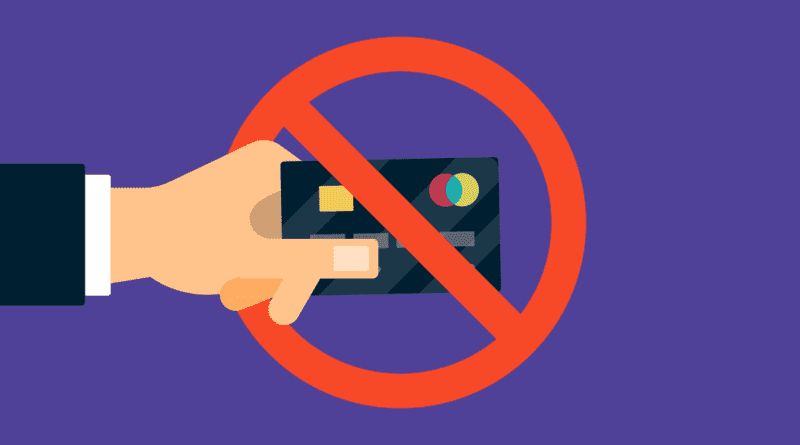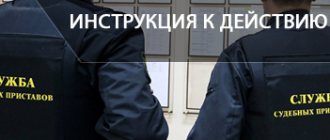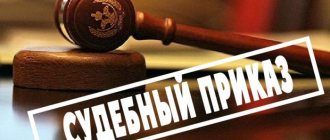Is it possible to challenge the withdrawal of money from my account?
Following the provisions of the Federal Law “On Enforcement Proceedings”, the injured party has the right to file a complaint against the actions of the bailiffs. The complaint can be sent to the territorial department of the FSSP, to the prosecutor's office or to the judicial authority at the place of residence.
Documents to challenge the actions of bailiffs:
- Complaint about illegal withdrawal of money from an account or legal action.
- Refusal document to provide a collection order (if the bailiffs refuse to issue it).
- Information about debiting money from the account in excess of the norm.
- Bank receipt for repayment of debt (term, amount, stamp).
- A copy of the agreement with the lender.
- Other documents.
Having received the statement of claim, the court begins to consider it. After rendering a verdict to satisfy the complaint of the injured party, the court sends a copy of the decision to the FSSP. Next comes the procedure for unlocking and returning previously debited funds from the account.
It is best to learn from competent lawyers about how best to draw up a complaint and where to file it.
Contacting the FSSP
To challenge an unlawful action or inaction of FSSP employees, you should first contact the executive officer. To do this you need:
- Obtain a copy of the arrest order from the bank. The document must indicate the person who is conducting the specific enforcement proceedings.
- Check the phone number at your local office and make an appointment; you can also do this on the website fssprus.ru.
- Prepare a package of documents confirming the applicant’s authority.
How to file an appeal against a decision
The package of documents must include:
- A copy of the resolution.
- Identity document.
- An application addressed to the bailiff, which briefly describes the essence of the appeal;
- Documents proving your rights. It can be:
- an account statement confirming the origin of your funds, which cannot be subject to seizure;
- 2-NDFL certificate from the employer, necessary to determine the amount of income and the amount to be collected (no more than 50%);
- an extract confirming the amount written off if the collection was made unlawfully;
- confirmation of debt repayment - a receipt or other payment document in cases where the debt is repaid but the restriction has not been lifted, or when a double write-off has occurred.
If contacting the bailiff does not help, you must appeal his actions to the territorial authority with the head of the department. Here you can .
If a response is not received from the manager or the citizen does not agree with it, the actions of the FSSP should be appealed to higher authorities.
Money was debited from the card twice
It happens that you have already paid off the debt, and you think the debts are gone, you can safely fly abroad, or maybe even on the way to the airport, but suddenly you received an unpleasant SMS with information about the write-off of a debt amount already familiar to you, which was already in due time paid, but this actually probably ruins the vacation, nerves and time. In this case, the bailiff simply did not receive information about the repayment of the debt and he needs to send a copy or provide the original payment slip, so that he, in turn, notes the repaid debt and sends information about the lifting of all arrests and bans on traveling abroad. So, if this is your case, then contact the bailiff as soon as possible and find out how you can provide information about paying the debt. Often bailiffs are very busy and personal meetings are very difficult, then the best way is to send a payment by email and after 7-10 days check your debt on the bailiffs website to be sure of the repaid debt.
How to find out the reason
Since banks are prohibited from warning clients about restrictive measures on an account, this may come as a complete surprise to a person. This is most often found out when trying to carry out any operation to withdraw or transfer money.
In the event that it is unknown why the arrest occurred, it is necessary:
- check with the bank the number of the enforcement proceedings within which the bailiffs acted;
- on the website fssprus.ru find this case and find out what specific obligations are presented for execution;
- Contact your local FSSP office to clarify the circumstances.
Mistakes that are made in enforcement proceedings
Since several stages pass from the issuance of a court decision to the transfer of information to the bank, bureaucratic oversights occur, as a result of which a citizen or legal entity remains the victim. Please pay attention to the following points:
- Failed identification error. This happens because when filling out the order, the bailiff is required to indicate only the full name and date of birth, as a result of which random coincidences occur or erroneous data is provided.
- Double arrest or double penalty. In such cases, the reason is the bailiff’s mistake: the amount of the collection was written off twice. It also happens that the debtor paid the debt, but the amount has already been written off. These errors are corrected during the proceedings, and the money is credited back.
- Collection of a debt from funds that, according to law, cannot be seized. This situation is not uncommon because the bank and the FSSP are not obliged to find out the origin of the funds. Therefore, only the citizen himself can challenge this action.
How much can bailiffs withdraw from a salary card?
Many who write to me and ask that if the debt is 55,000 rubles, and sometimes more, and there are only 5,000 rubles on the salary card, then I will tell you that the bailiffs can withdraw more from the salary card than is on it and, accordingly, the debt will already arise before the bank, and not before the creditor. Think about it and take note.
If benefits and other social transfers come to the card, then familiarize yourself with them and you will be able to challenge the actions of the bailiff.
Whether you have two or three cards, the bailiff will indiscriminately seize all existing cards and write off them until the debt is fully repaid.
Main reasons for withdrawal of funds
- It is worth noting that the Federal Bailiff Service, among the functions assigned to them, has the right to write off funds from the bank accounts of citizens of the Russian Federation if the latter evade the execution of a court decision or do not want to pay bills for the provided utility services.
- According to the norms of the current legislation, FSSP employees have the right to request complete information about the taxpayer in all banking institutions, but most often bailiffs withdraw money from a salary card, less often money is transferred from a credit card or deposit.
- All actions of the Federal Bailiff Service are approved and regulated by Federal Law No. 229 “On Enforcement Proceedings”.
The main reasons for collecting funds
Now let's talk about the reasons that can provoke the write-off of funds without the direct participation of the card owner.
Bailiffs have the right to seize funds from debtors’ bank accounts in the following situations:
- if the owner of the vehicle has unpaid fines for violating traffic rules;
- in case of evasion of payment of alimony established by the court;
- in case of overdue loan obligations;
- in case of non-payment of bills for provided utility services over a long period;
- other debts, administrative fines.
Based on the writ of execution, the bank, if the client is recognized as a debtor in court, has the right to withdraw funds from the debtor’s account even if the debtor himself was not notified of the possible write-off.
What can be done to lift the arrest and will lack of notification affect this?
And here we come to the most pressing question: what can be done when bailiffs have seized your bank account. And here you can take one of several paths.
The easiest way to return funds from your account is to simply pay off your debt, after which the seizure will be lifted in the blink of an eye. But if it is impossible to do this at the moment, or the loan was simply taken out of thin air, and you have nothing to do with it, then you need to go to court.
There they will be able to solve this problem in a more radical way, up to and including removing your obligations to repay the loan early, in the event of being declared bankrupt and several other circumstances.
How to remove an arrest?
Well, if the seizure of a bank account by bailiffs was carried out illegally, then there are much more options for action. So for example you can:
- First of all, contact Sberbank with demands for an explanation of the reasons for the arrest. In turn, the bank employee is obliged to provide you with all the information about why the account was blocked by the bailiffs and, in addition, provide a request and arrest order with the name of the bailiff, for the further possibility of an appeal.
- Ask the bank to provide you with relevant information about where the money is coming from into your account.
- Fill out an application in which you ask, referring to the law on the seizure of accounts by bailiffs, to lift the seizure. The application must be submitted to a senior executive. In addition, it is necessary to attach bank statements, as well as certificates and a well-formatted complaint sheet, which will describe all your dissatisfaction with the current situation.
- Your application must be responded to within two weeks.
- If there is no response, or the application was rejected, then it is necessary to go to court with the relevant claims, or file complaints with the regional managers for managing the bailiff service. In this case, you will not find examples of such statements on the Internet, and the only rule here is legally competent sentences. Therefore, it is advisable to contact a notary so that he can help you formalize everything, or use the help of a lawyer, if you have one.
Account blocking by bailiffs
The bank performs this write-off without the client's permission. Bailiffs have the right to withdraw money from a bank account if enforcement proceedings are underway against the debtor to repay the debt. If such a write-off occurs without warning for the debtor, then most likely he did not notify the bailiffs of his location and contacts. Because the bailiffs must inform the debtor about the commencement of enforcement proceedings and, then, about issuing a writ of execution to the recoverer or sending it to the bank. Moreover, such a procedure is mandatory, but solely of a notification nature, that is, the bank does not require consent from the debtor to write off the debtor’s bank card.
In this case, another hidden mechanism for covering debts comes into play: bailiffs contact the bank servicing the debtor and write off the required amount of funds from his account or card. The mechanism for writing off funds from bank accounts of debtors by order of bailiffs has been a legal and generally accepted practice since the year of Art. Even at that time it was legally established that:
Bailiffs withdraw money from the salary card if a case has been opened against the debtor and his writ of execution has been submitted to the bailiff service. After all, they have the right to seize not only property, but also the funds available to the debtor and use them to pay off the debt. Thus, bailiffs can withdraw money from a salary card without written notice to the debtor. It should be remembered that the bailiffs do not care whether the card contains your personal funds or whether it is a loan given to you by the bank. Thus, in our article we will understand this complex issue and talk about all the nuances that arise.
Wage garnishment - is it legal?
In accordance with Part 2. Art. 99 of the Law, when executing an executive document (several executive documents), no more than fifty percent of wages and other income may be withheld from a debtor-citizen. Withholdings are made until the requirements contained in the executive document are fulfilled in full.
We recommend reading: Blackout Novosibirsk Today
The amount of deductions from wages cannot exceed 50%. Your husband should be returned the illegally collected amount after he writes a statement and provides a document confirming that his salary is transferred to this account. Please keep in mind that if there were any savings on the account, they will be recovered in full, with the exception of the last salary. If there are difficulties, please contact me, I will help, this is my specialty.
How to find out for what fine the bailiffs withdrew money from the account
.
And what to do if money has been debited from the card. According to the law, bailiffs collect the debt from the debtor forcibly. The Post Office forwards this notification to the bailiff, who. Does it happen that money is collected without a decree? And if there is not enough money, the account is frozen.
.
How is money withdrawn from the debtor's account?
The procedure for withdrawing money from a bank account is somewhat different from the inventory of the debtor's property. So, if in the second case the bailiff does not have the right to seize property in the apartment without the presence of the debtor, then withdrawing money from the account does not require the participation of the borrower.
Moreover, the bailiff does not have to obtain the debtor’s consent to carry out the collection. It is enough for the FSSP employee to notify the debtor about the withdrawal of money by registered letter by mail.
It’s another matter if this letter does not reach the addressee or the debtor receives a notification after the money has been debited from the account.
But these are the costs of enforcement proceedings, for which the postal service is solely responsible.
The procedure for debiting money from an account includes:
- Receipt by the bailiffs of official paper - writ of execution.
- Creating and sending a copy of the resolution to the debtor.
- Sending a request to banks in order to search for current accounts, deposits, deposits and other accounts of the debtor.
- Suspension of banking operations, “freezing” of money on the personal balance sheet and transferring it to repay the debt.
- In case of full repayment, the arrest will be removed from the account. If the money in the account is not enough to pay off the debt, then the withdrawal will be applied to the money newly received into the account (for example, wages).
According to the new rules, banks are not required to notify the debtor about the write-off of money by bailiffs. In this case, the procedure affects only two entities - the FSSP and the banking institution. Therefore, in order to find out about the write-off, the account owner must send a request to the bank or contact the territorial bailiff office.
How long does an account freeze last?
Funds are blocked in the account until the entire debt is repaid. If a person does not do this voluntarily, then the bailiff will write it off on his own. What happens next? There are two options:
- if there is not enough money in the account, then the bailiff will withdraw the entire amount, and 50% will be charged from subsequent receipts until the entire debt is repaid;
- if the amount that is in the debtor’s account covers what is stated in the bailiff’s writ of execution, then the arrest will be lifted - after which the account will be unblocked for some time.
It should be noted that the account must be unblocked at the moment when the debt is repaid. However, in practice, you have to wait up to three days until all bureaucratic procedures are completed (both at the FSSP and at the bank itself).
These cards are blocked less often by bailiffs
#all at once
Raiffeisenbank
Debit card
- 4.5% on balance
- 3.9% cashback on everything
- 0₽ for service
More details
№1 Ultra
Eastern Bank
Debit card
- 5% on balance
- up to 7% cashback
- 0₽ for service
More details
Benefit
Home Credit Bank
Debit card
- 5% on balance
- up to 22% cashback
- 0₽ for service
More details
What to do?
My salary card was seized by bailiffs, what should I do?
To correct this situation, you need to perform a number of actions:
- Get a certificate indicating that the card is blocked, then find out the reason.
- Go to the bailiffs and fill out an application for withdrawing funds from the card. It is important to understand that as long as the debt exists, the bailiffs will withdraw half of the salary every month until the debt obligations are fulfilled.
- If you do not want to personally visit the bailiff service, then you can agree with the employer to receive your wages “in hand.”
- Make attempts to negotiate with the creditor so that he withdraws his claim to seize the card. To do this, you will need to meet with him and pay part of the debt.
- If you do not want to meet with bailiffs and creditors, then you can only challenge their claim in court. We recommend this option to people whose salary is not the only source of income.
The best way out of the situation would be to pay off the debt. As soon as it is paid, the bailiffs will send a message to the banking organization with a request to cancel the previously imposed arrest.
Submitting an application
To unblock the card, you need to fill out an application at the reception office of the bailiff service.
It should include the following information:
- full name of the service;
- the address where the service is located;
- Full name of the bailiff;
- Full name of the applicant;
- registration of the applicant;
- the date on which enforcement proceedings were opened;
- production number;
- code of the conclusion on the basis of which enforcement proceedings are ordered;
- name of the bank servicing the card;
- number of the card that was seized.
It is recommended to have several copies of the application on hand. One must be handed over to the bailiff service, the other will be marked with acceptance for consideration.
When writing your application, it is recommended to use a pen with black ink. All information provided must be brief, but fully describe the current situation.
What it is?
Seizure is one of the types of restrictions used when its owner has large debts.
The bailiff may deduct part of the funds from your salary or credit card, or seize it completely.
The legislative framework
The legislative basis for the issue under consideration is Federal Law No. 229 “On Enforcement Proceedings”.
Moreover, individual articles of the Civil Code of the Russian Federation and the Code of Civil Procedure of the Russian Federation are taken into account.
Reasons why an account may be blocked?

The main reasons for seizing a card account are:
- evasion of alimony payments;
- growing debts to housing and communal services;
- credit arrears;
- administrative fines not paid on time.
Expert opinion
Alexander Ivanovich
Financial expert
Important: bailiffs can collect funds from debtors not only through the bank, but also through the employer, sending him a request to transfer part of the employee’s salary to the plaintiff’s account.









